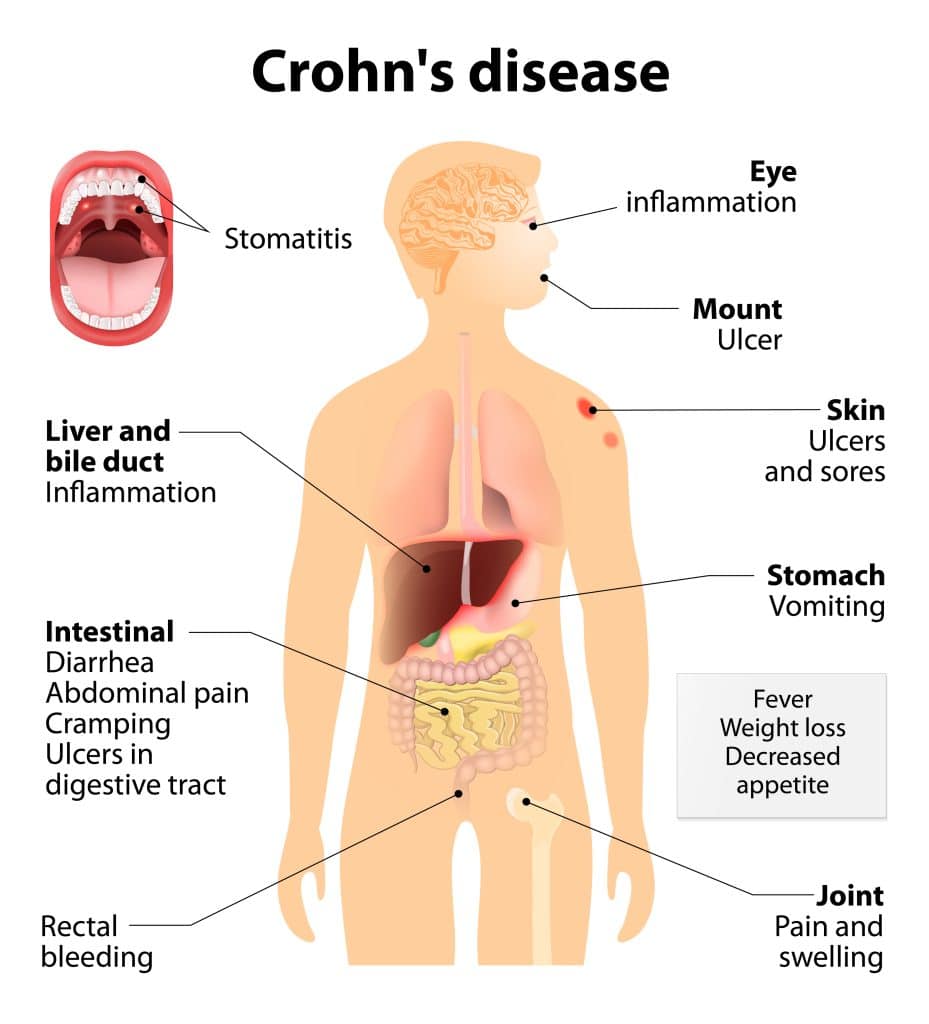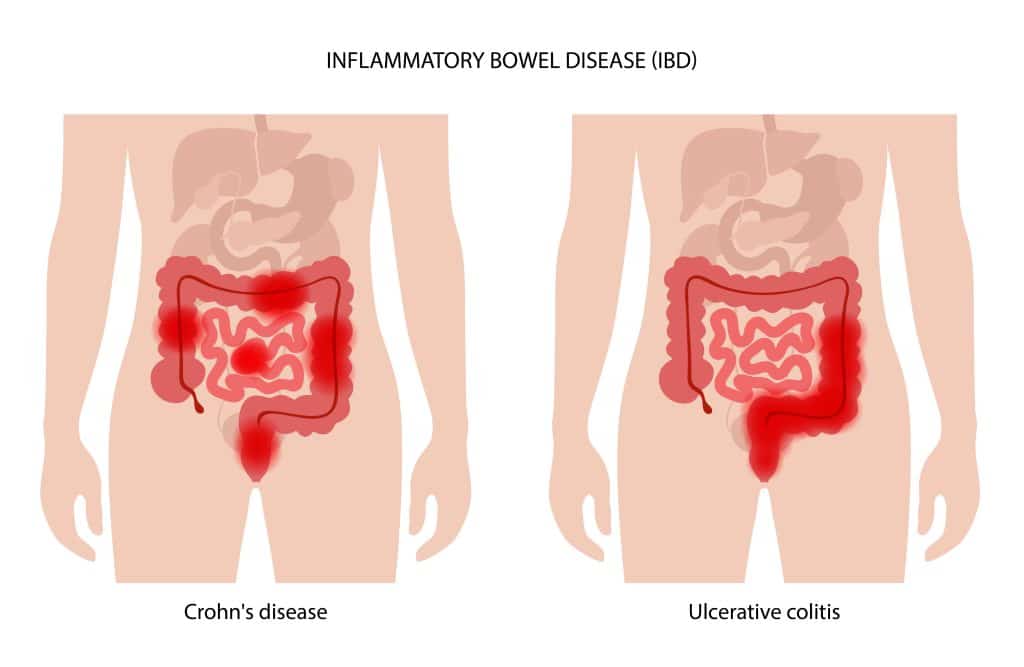What Causes Crohn’s Disease – And How To Manage It
Exactly what causes Crohn’s disease is unknown, although it appears to be a combination of factors like other autoimmune conditions. Genetics, environmental factors, and microbiome dysfunction all play a role in the development of Crohn’s disease.
Crohn’s disease (CD) is a type of inflammatory bowel disease (IBD) that is chronic and characterized by recurring inflammation. The inflammation can affect any part of the gastrointestinal tract, from the mouth to the anus. CD causes a variety of symptoms that may vary in severity and type depending on where it is affecting the digestive system. Common symptoms include abdominal pain and cramping, diarrhea, fatigue, weight loss, and reduced appetite. In some cases, people with CD may also experience joint pain and skin rashes.
Diagnosis for Crohn’s disease is based on a combination of medical history, physical exam, and laboratory tests. Blood tests can help determine if there is an inflammatory component to the disease, and other tests such as colonoscopy or endoscopy are used to look at the lining of the intestines for signs of CD. In some cases, imaging studies such as CT scans or MRIs may be used to look at the structure of the intestines.
Treatment for Crohn’s disease typically involves medications to reduce inflammation and relieve symptoms. These medications can include corticosteroids, immunosuppressants, biologics, and antibiotics.1 However, these treatments don’t address exactly what causes Crohn’s disease.

What Causes Crohn’s Disease – 3-Legged Stool
Individuals who suffer from autoimmune conditions like Crohn’s disease have a genetic predisposition, microbiome dysfunction, and environmental factors like toxins that contribute to the development of the condition. This is what I refer to as the 3-legged stool.
While we can’t change our DNA structure, we can influence epigenetic expression by removing toxins from our bodies and improving microbiome composition. By simply removing environmental toxins from our lives and improving our diet, many forms of autoimmune conditions disappear.
What Causes Crohn’s Disease – Genetics
Certain genetic mutations are associated with Crohn’s disease, as studies of identical twins have indicated that when one twin has Crohn’s disease, the other is likely to develop it as well.2 This suggests that a person’s genes may play a role in deciding whether or not they will get the condition. Research has identified certain gene mutations which are more prevalent among those with Crohn’s disease compared to healthy individuals, further suggesting a genetic component to the condition.3
What Causes Crohn’s Disease – Infections
Evidence suggests that infectious agents such as mumps play a role in triggering the development of Crohn’s disease in those who are genetically predisposed to it. Mumps is a viral infection that used to be very common in children before the development of the mumps vaccine. The virus can cause inflammation and swelling of the salivary glands, which may lead to complications such as meningitis or encephalitis.4
What Causes Crohn’s Disease – Immunological Factors
Immunological factors play a significant role in the development of Crohn’s disease. It is believed that an abnormal response by the body’s immune system may cause inflammation that results in the damage seen in Crohn’s disease.
The exact mechanisms of this process are not yet entirely understood, but various theories have been proposed. One theory suggests that the body’s immune system may mistakenly recognize harmless materials in the intestine, such as foods, bacteria, and other substances, as foreign invaders. In response to this perceived threat, an overactive immune system produces proteins called cytokines that cause inflammation in the intestines.5
What Causes Crohn’s Disease – Environmental Factors
Research has found that people who live in a developed country are more likely to be affected by Crohn’s Disease than those who live in undeveloped countries. This suggests that the environment contributes to the development of Crohn’s disease.6
Environmental factors such as diet, stress, oral contraceptives, and antibiotics have been shown to contribute to Crohn’s disease. Exposure to certain substances, such as cigarette smoke, smoke from burning materials, and chemicals used in farming also increases a person’s risk of developing Crohn’s disease.7 8

What Causes Crohn’s Disease – Smoking
Smoking is one of the most significant contributing factors to Crohn’s Disease. Studies have found that smokers are more likely to develop and worsen their Crohn’s disease symptoms than non-smokers. It is believed that smoking irritates the digestive tract, which can lead to inflammation and increase the risk of developing Crohn’s disease.
Smoking also reduces immune system function, making it difficult for the body to fight off infections that can lead to Crohn’s disease. Quitting smoking is one of the best ways to reduce the risk of developing or worsening Crohn’s Disease. Additionally, if you have already been diagnosed with Crohn’s disease, quitting smoking can help improve symptoms and make them more manageable over time.9
What Causes Crohn’s Disease – Oral Contraceptives
Oral contraceptives are known to play a role in the development of Crohn’s disease. This is thought to be due to the presence of hormones, such as estrogen and progesterone, which are found in many oral contraceptives. These hormones affect the immune system and can cause inflammation in the digestive tract, which can lead to Crohn’s disease.10
What Causes Crohn’s Disease – Long-Term NSAID Use
Long-term use of nonsteroidal anti-inflammatory drugs (NSAIDs) has been linked to an increased risk for Crohn’s disease. NSAIDs, such as ibuprofen and aspirin, are commonly used to treat pain and inflammation. Studies have found that individuals who take these medications long-term are much more likely to develop Crohn’s disease than those who do not take them.11
What Causes Crohn’s Disease – Childhood Antibiotic Use
Childhood antibiotic has been shown to play a role in the development of Crohn’s disease due to changes in the gut microbiome caused by antibiotics.12
What Causes Autoimmune Conditions – Environmental Toxins
Environmental toxins, such as pesticides, heavy metals, and other pollutants, also contribute to the development of autoimmune conditions. Exposure to these substances can trigger an immune response that results in the body attacking its own tissues and organs instead of pathogens or invading cells.
Additionally, some environmental toxins are known to disrupt the delicate balance of hormones in the body, which may also lead to an autoimmune reaction. Reducing exposure to these toxins and toxic chemicals can help reduce the risk of developing autoimmune diseases. For instance, avoiding contact with pesticides and other chemicals used in agriculture can help protect against the development of autoimmune conditions.

What Causes Crohn’s Disease – Low Manganese Levels Due To Glyphosate Exposure
Glyphosate is the active ingredient in many weed-killing products, and it can have a devastating effect on manganese levels in the body. Glyphosate has been linked to lower manganese levels in humans, which can lead to deficiencies that contribute to Crohn’s disease. Low levels of manganese are also associated with an increased risk of inflammation and other inflammatory bowel diseases.
Manganese is an essential mineral needed for many processes in the body, including digestion, energy production, hormone regulation, and nervous system function. When manganese levels are too low, it can lead to a variety of health issues, including Crohn’s disease. Studies have shown that glyphosate exposure can significantly reduce manganese levels in humans and animals, which can lead to a variety of digestive issues.
Unfortunately, glyphosate is found in many of our food sources, making it even more important to be mindful of your intake. Eating an organic diet that is free from glyphosate exposure may help reduce the risk of Crohn’s disease by keeping manganese levels up.13
Read more about how toxic glyphosate is.
What Causes Crohn’s Disease – Low Vitamin D Levels
Recent research has suggested that low vitamin D levels are linked to an increased risk of developing Crohn’s Disease. Vitamin D is an essential vitamin that helps the body absorb important minerals, like calcium and phosphorus, from the food we eat. It also plays a role in our immune system by helping to regulate inflammation and strengthen our gut barrier. Low levels of vitamin D have been linked to several inflammatory diseases including multiple sclerosis, lupus, and rheumatoid arthritis.
Low vitamin D levels can weaken the intestinal wall, making it more vulnerable to bacteria and viruses. This weakens the immune system and increases inflammation in the intestines, which is a common symptom of Crohn’s disease. Additionally, research has shown that people with Crohn’s often have lower vitamin D levels than those without the condition.
It’s important to ensure that you are getting enough vitamin D, ideally from sun exposure. Eating foods high in vitamin D, like fatty fish, eggs, and mushrooms, can help maintain healthy levels. If that is not enough, taking a daily supplement may be beneficial.14
Read more about the link between low vitamin D levels and autoimmune conditions.

What Causes Crohn’s Disease – Microbiome Dysfunction
The microbiome plays an essential role in maintaining good health, and research has demonstrated a link between the imbalance of the microbiome and the development of Crohn’s disease. Studies have found that individuals with Crohn’s tend to have lower counts of beneficial bacteria than those without. This can result in a decrease in important nutrients being absorbed from food, leading to malnutrition and inflammation in the digestive tract.15
What Causes Crohn’s Disease – And How To Manage It
Exactly what causes Crohn’s disease is not clearly identified, however, genetics, environmental factors like toxins, and the microbiome environment all play a role. The key to managing and reducing the potential for developing this disease is to reduce exposure to environmental toxins and live a healthy lifestyle that focuses on proper diet and exercise.
Read more about IBD.
References
1 Ha F, Khalil H. Crohn’s disease: a clinical update. Therap Adv Gastroenterol. 2015 Nov;8(6):352-9. doi: 10.1177/1756283X15592585. PMID: 26557891; PMCID: PMC4622286.
2 Spehlmann ME, Begun AZ, Burghardt J, Lepage P, Raedler A, Schreiber S. Epidemiology of inflammatory bowel disease in a German twin cohort: results of a nationwide study. Inflamm Bowel Dis. 2008 Jul;14(7):968-76. doi: 10.1002/ibd.20380. PMID: 18253950.
3 Cappello M, Morreale GC. The Role of Laboratory Tests in Crohn’s Disease. Clin Med Insights Gastroenterol. 2016 Aug 18;9:51-62. doi: 10.4137/CGast.S38203. PMID: 27656094; PMCID: PMC4991576.
4 Ng SC, Woodrow S, Patel N, Subhani J, Harbord M. Role of genetic and environmental factors in British twins with inflammatory bowel disease. Inflamm Bowel Dis. 2012 Apr;18(4):725-36. doi: 10.1002/ibd.21747. Epub 2011 May 6. PMID: 21557397.
5 Li N, Shi RH. Updated review on immune factors in pathogenesis of Crohn’s disease. World J Gastroenterol. 2018 Jan 7;24(1):15-22. doi: 10.3748/wjg.v24.i1.15. PMID: 29358878; PMCID: PMC5757119.
6 Lo B, Vester-Andersen MK, Vind I, Prosberg M, Dubinsky M, Siegel CA, Bendtsen F, Burisch J. Changes in Disease Behaviour and Location in Patients With Crohn’s Disease After Seven Years of Follow-Up: A Danish Population-based Inception Cohort. J Crohns Colitis. 2018 Feb 28;12(3):265-272. doi: 10.1093/ecco-jcc/jjx138. PMID: 29506105.
7 Chen Y, Wang Y, Shen J. Role of environmental factors in the pathogenesis of Crohn’s disease: a critical review. Int J Colorectal Dis. 2019 Dec;34(12):2023-2034. doi: 10.1007/s00384-019-03441-9. Epub 2019 Nov 16. PMID: 31732875.
8 Berg AM, Dam AN, Farraye FA. Environmental influences on the onset and clinical course of Crohn’s disease-part 2: infections and medication use. Gastroenterol Hepatol (N Y). 2013 Dec;9(12):803-10. PMID: 24772046; PMCID: PMC3999994.
9 Halfvarson J, Jess T, Magnuson A, Montgomery SM, Orholm M, Tysk C, Binder V, Järnerot G. Environmental factors in inflammatory bowel disease: a co-twin control study of a Swedish-Danish twin population. Inflamm Bowel Dis. 2006 Oct;12(10):925-33. doi: 10.1097/01.mib.0000228998.29466.ac. PMID: 17012962.
10 Cornish JA, Tan E, Simillis C, Clark SK, Teare J, Tekkis PP. The risk of oral contraceptives in the etiology of inflammatory bowel disease: a meta-analysis. Am J Gastroenterol. 2008 Sep;103(9):2394-400. doi: 10.1111/j.1572-0241.2008.02064.x. Epub 2008 Aug 5. PMID: 18684177.
11 Ananthakrishnan AN, Higuchi LM, Huang ES, Khalili H, Richter JM, Fuchs CS, Chan AT. Aspirin, nonsteroidal anti-inflammatory drug use, and risk for Crohn disease and ulcerative colitis: a cohort study. Ann Intern Med. 2012 Mar 6;156(5):350-9. doi: 10.7326/0003-4819-156-5-201203060-00007. PMID: 22393130; PMCID: PMC3369539.
12 Hviid A, Svanström H, Frisch M. Antibiotic use and inflammatory bowel diseases in childhood. Gut. 2011 Jan;60(1):49-54. doi: 10.1136/gut.2010.219683. Epub 2010 Oct 21. PMID: 20966024.
13 Samsel A, Seneff S. Glyphosate, pathways to modern diseases III: Manganese, neurological diseases, and associated pathologies. Surg Neurol Int. 2015 Mar 24;6:45. doi: 10.4103/2152-7806.153876. PMID: 25883837; PMCID: PMC4392553.
14 Jørgensen SP, Agnholt J, Glerup H, Lyhne S, Villadsen GE, Hvas CL, Bartels LE, Kelsen J, Christensen LA, Dahlerup JF. Clinical trial: vitamin D3 treatment in Crohn’s disease – a randomized double-blind placebo-controlled study. Aliment Pharmacol Ther. 2010 Aug;32(3):377-83. doi: 10.1111/j.1365-2036.2010.04355.x. Epub 2010 May 11. PMID: 20491740.
15 Caputo A, Fournier PE, Raoult D. Genome and pan-genome analysis to classify emerging bacteria. Biol Direct. 2019 Feb 26;14(1):5. doi: 10.1186/s13062-019-0234-0. PMID: 30808378; PMCID: PMC6390601.




